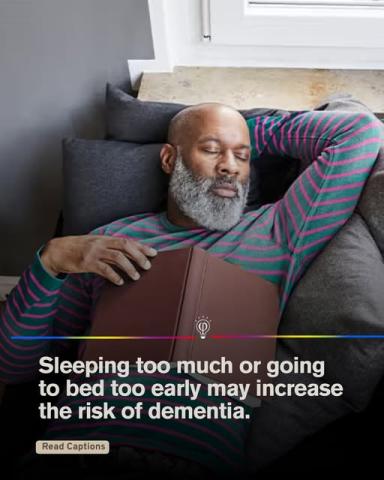For decades, the advice has been simple: get plenty of sleep. It's as fundamental to health as a solid serve is to tennis. But new research suggests that when it comes to sleep, especially for older adults, there might be such a thing as too much of a good thing. It turns out, over-serving your sleep could be a double fault for your brain health.
A groundbreaking new study has sent a shockwave through the medical community, revealing that adults aged 60 to 74 who go to bed exceptionally early or log long hours in bed may face a significantly higher risk of developing dementia.
The Study: Tracking the Scoreboard for Four Years
Researchers meticulously tracked nearly 2,000 older adults over a four-year period, carefully monitoring their sleep patterns and cognitive health. The results were striking:
- The Early Birds: Participants who consistently went to bed before 9 p.m. were found to be twice as likely to develop dementia compared to those with a later bedtime.
- The Long Sleepers: Those who regularly slept more than eight hours a night faced a 69% greater risk of dementia than their peers who got the recommended seven to eight hours of rest.
This isn't to say that a good night's sleep is suddenly bad. The key, as in tennis, is finding the perfect balance. The "sweet spot" for sleep—much like the sweet spot on a racket—appears to be that classic seven-to-eight-hour window.
The Tennis Connection: Mental Agility On and Off the Court
Why is this relevant to the tennis community? Because the sport is a game of the mind as much as it is of the body. Quick reflexes, strategic thinking, sharp hand-eye coordination, and mental resilience are all built on the foundation of a healthy, well-rested brain.
Dementia and cognitive decline directly threaten the very skills that allow players to enjoy the game well into their later years. Staying mentally sharp means being able to anticipate an opponent's shot, adjust tactics mid-match, and even simply keep score. Protecting brain health is paramount for anyone who wants to keep playing the game they love.
Is It Cause or Effect? The Match Isn't Over.
An important question remains: is sleeping too much or too early a cause of dementia, or is it an early symptom?
Many scientists theorize that changes in the brain associated with early-stage dementia can also disrupt the body's internal clock, leading to altered sleep patterns. Going to bed extremely early or sleeping for extended periods could be the brain's way of showing the first signs of trouble, long before a formal diagnosis is made.
Either way, the correlation is too strong to ignore. Monitoring sleep patterns could become a crucial early warning system, much like a player noticing a slight tweak in their swing before it becomes a full-blown injury.
The Game Plan for Healthy Sleep
So, what’s the takeaway for players looking to protect their mental edge?
- Aim for the Sweet Spot: Prioritize getting a consistent seven to eight hours of sleep per night.
- Keep a Regular Schedule: Try to go to bed and wake up at similar times each day, even on weekends, to keep your internal clock in rhythm.
- Listen to Your Body (and Your Doctor): If you or a loved one are experiencing a significant shift in sleep patterns—especially a sudden urge to sleep much longer or go to bed unusually early—it’s worth discussing with a healthcare professional.
Just as you wouldn't over-hit on every shot, don't overdo it on sleep. A balanced routine is the best strategy to ensure you stay mentally fit, agile, and ready for match point for years to come.

